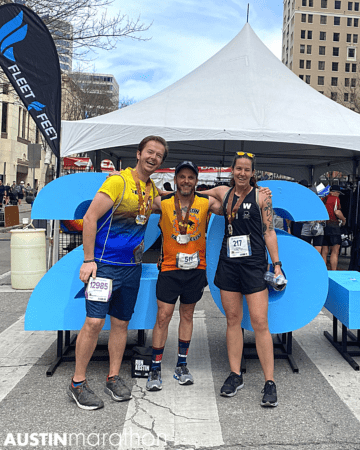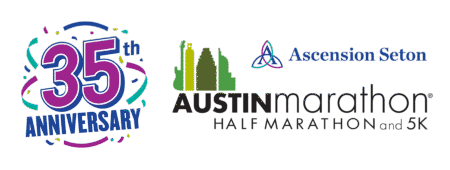Plantar Fasciitis: What to Know and How It Impacts Your Training
Ascension Seton’s Dr. Allen breaks down Plantar Fasciitis and its impact on runners
Plantar Fasciitis is an ailment that most runners will experience at some point in their life. Fortunately, there are many options for runners to overcome this injury. The most common symptom is pain in the heel. Typically this occurs in the morning and is aggravated during the push-off phase. Plantar Fasciitis is caused by the tightening and inflammation of the band of fascia (connective tissue) that connects the heel to the metatarsals. This tightening can be caused by a number of factors. One factor can be overly tight calf muscles that pull on the fascia under the foot. Treatment involves reducing inflammation, strengthening the muscles in the kinetic chain, and lengthening the fascia.

Build strength now so you can finish your race strong.
Preventative measures
It is important for all runners to build strength training into their schedule, especially if they’re training for their first marathon. Strength training has proven benefits like maintaining muscle mass throughout the lifespan, reducing injury risk, and improving running economy. Off-season strength training should lay the foundation for more sport-specific training throughout the competitive part of the season. When beginning a strength training program, high repetitions and low weight should be the primary focus. This helps build general strength. As training progresses functional strength is established. This eventually leads to an increase in weight and more advanced exercises like plyometrics and power-focused training at high velocities.
Exercises and recovery
Strength training exercises such as single-leg calf raises can be very beneficial for strengthening the kinetic chain above the foot, reducing the likelihood of developing Plantar Fasciitis. Additionally, runners should incorporate stretching into their training program. This can help avoid overly tight calf muscle that can aggravate Plantar Fasciitis. Foam rolling and traditional calf stretches are both effective for loosening these muscles. Runners can also use a golf ball or other similarly sized round object to roll out the fascia on the bottom of their feet. It is also important that runners wear comfortable running shoes and limit their mileage increases to less than 10% per week.

Don’t let Plantar Fasciitis derail your training and you’ll be all smiles at the finish line.
This advice is intended to be for educational purposes. It’s in no way intended to be a substitute for any treatment prescribed by a doctor. If you are concerned about pain caused by running, Ascension Seton’s team of Sports Medicine physicians will work with you to address your injury. Runners can contact them by calling 512-324-0177. Additionally, they’ll work with you to establish a strength training program to prevent and address your ongoing running injuries. If you are interested in learning more about a strength training program for runners email ascensionperformance@ascension.org.
About Dr. Allen
Dr. Jakob Allen received his Doctoral training from the nationally ranked University of Texas at Austin. He was an 8x All-American collegiate swimmer at Stanford, American Record holder, NCAA and Pac-10 Champion, and 2x Olympic Trials qualifier. Dr. Allen is now an avid cyclist and triathlete, frequently placing in the top-5 overall amateurs in Central Texas triathlons. He is driven to bring about the greatest potential of all athletes whether you are a weekend warrior or an Olympian.
Dr. Allen currently serves as the Sports Scientist for the Austin Bold FC team in addition to his work in the clinic. He believes that exercise remains one of the best ways to improve every physiological system in the body throughout the lifespan. Whether it’s helping prevent changes in mental acuity or improving muscle function, the benefits of exercise continue to be supported by scientific studies. Dr. Allen specializes in designing exercise training programs for improving muscle and cardiovascular health for aging wellness and masters athlete performance.



